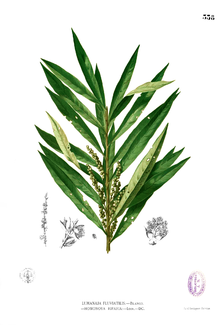|
Genus of flowering plants
Homonoia is a plant genus of the family Euphorbiaceae first described in 1790.[3][4] These are rheophytes and usually found in groups at riverbanks in India, southern China, Southeast Asia, and New Guinea.[5][6][7][8]
- Species[2]
- Homonoia intermedia Haines - India
- Homonoia retusa (Graham ex Wight) Müll.Arg. - India, Vietnam
- Homonoia riparia Lour. - Guangxi, Guizhou, Hainan, Sichuan, Taiwan, Yunnan, Cambodia, India, Assam, Bhutan, Sri Lanka, Borneo, Java, Lesser Sunda Islands, Sulawesi, Sumatra, Maluku, Laos, Malaysia, Myanmar, Philippines, Thailand, Vietnam, New Guinea, Andaman & Nicobar Islands
- formerly included
moved to other genera (Lasiococca Spathiostemon)
- Homonoia comberi - Lasiococca comberi
- Homonoia javensis - Spathiostemon javensis
- Homonoia pseudoverticillata - Lasiococca comberi
- Homonoia symphyllifolia - Lasiococca symphyllifolia
References
Wikimedia Commons has media related to Homonoia.
- ^ 1880 illustration from Francisco Manuel Blanco (O.S.A.) - Flora de Filipinas
- ^ a b Kew World Checklist of Selected Plant Families
- ^ Loureiro, João de. 1790. Flora Cochinchinensis 601, 636 in Latin
- ^ Tropicos, genus Homonoia[permanent dead link]
- ^ Flora of China Vol. 11 Page 167, 247 水柳属 shui liu shu Homonoia Loureiro, Fl. Cochinch. 2: 636. 1790.
- ^ Govaerts, R., Frodin, D.G. & Radcliffe-Smith, A. (2000). World Checklist and Bibliography of Euphorbiaceae (and Pandaceae) 1-4: 1-1622. The Board of Trustees of the Royal Botanic Gardens, Kew.
- ^ Balakrishnan, N.P. & Chakrabarty, T. (2007). The family Euphorbiaceae in India. A synopsis of its profile, taxonomy and bibliography: 1-500. Bishen Singh Mahendra Pal Singh, Dehra Dun.
- ^ van Welzen, P.C. & Chayamarit, K. (2007). Flora of Thailand 8(2): 305-592. The Forest Herbarium, National Park, Wildlife and Plant Conservation Department, Bangkok.
|
